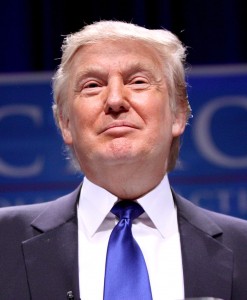I think you could argue that if we characterized candidates for the presidency in Freudian terms, that Hillary Clinton would come out as the ego—rational, measured, pragmatic—and Bernie Sanders as the superego—idealistic, moralistic, principled. But there can be no doubt as to who perfectly plays the role of the id, the instinctual,  passionate, utterly self-centered side of human nature. If a person was ever entitled to wear a name badge declaring “Hello, my name is ID” it would be Donald Trump.
passionate, utterly self-centered side of human nature. If a person was ever entitled to wear a name badge declaring “Hello, my name is ID” it would be Donald Trump.
Which might just explain his popularity. Democrats, independents and mainstream Republicans have all expressed mounting disbelief that a man so arrogant, so ignorant, so narcissistic and bombastic could actually be the front-runner for the Republican nomination to the highest office in the land. Unlike George W. Bush, who may have been a terrible president, but came across as a nice guy to have a beer with, you can only imagine Trump at your backyard barbecue haranguing your mother, the only one too polite to avoid him, and pissing off the neighbors as he throws beer bottles over the fence.
Nobody in their right mind would want to hang out with Donald Trump. The only explanation I can find for his success is that some part of each of us wants to be Donald Trump. The id part of our psychological makeup wants to be free to be selfish, to be casually dismissive of those who might have a claim on our time or money or attention, to be paranoid about those we see as different. It would just be so easy, so freeing, so, well, fun to have permission to let all those natural urges hang out there for everyone to see.
After all, those of us who are white and/or straight and/or male and/or wealthy have been challenged of late to see and address the ways that we have been given privileges, have been placed, through no virtue of our own, at the center of our national story. We grew up assuming that who we are and how we are is “normal,” and now people of color and LGBT folk and disabled folk and women and fat people and immigrants and God knows who else are all demanding that their lives and stories get a place at the table.
And it’s never comfortable to have your world rearranged. It may be exhilarating or inspiring or fascinating, and it is certainly just, but it is never comfortable. And even the folks who have not committed themselves to the process of change are feeling the effects. Generally speaking, outright racist, sexist or homophobic jokes are no longer permissible in polite company. #BlackLivesMatter is in the news, and at some point one might just have to ask not only what is going on but also why. And you might not like the answer, might resist being called to see the world through someone else’s eyes.
And if you are Donald Trump, you don’t have to. The popularity of Donald Trump blatantly asserts—trumpets, if you will—that you are fully entitled to your prejudices and your paranoias and your privileges. How refreshing! How natural!
And, of course, how utterly wrong. This is where religion comes in. Because any religion, every religion, issues a challenge to become better than we are. Every religion, at its heart, tries to nudge us away from the control of the selfish id and toward a broader compassion. Donald Trump is the Anti-Christ. Also the Anti-Buddha, the Anti-Mohammed, the Anti-Moses. It is the responsibility of those of us who take on the mantle of religion—any religion—to pull ourselves toward a higher standard, a deeper authenticity, a broader view. Which isn’t always easy, but is always necessary. Because we all deserve so much better than anything Donald Trump has on offer.











